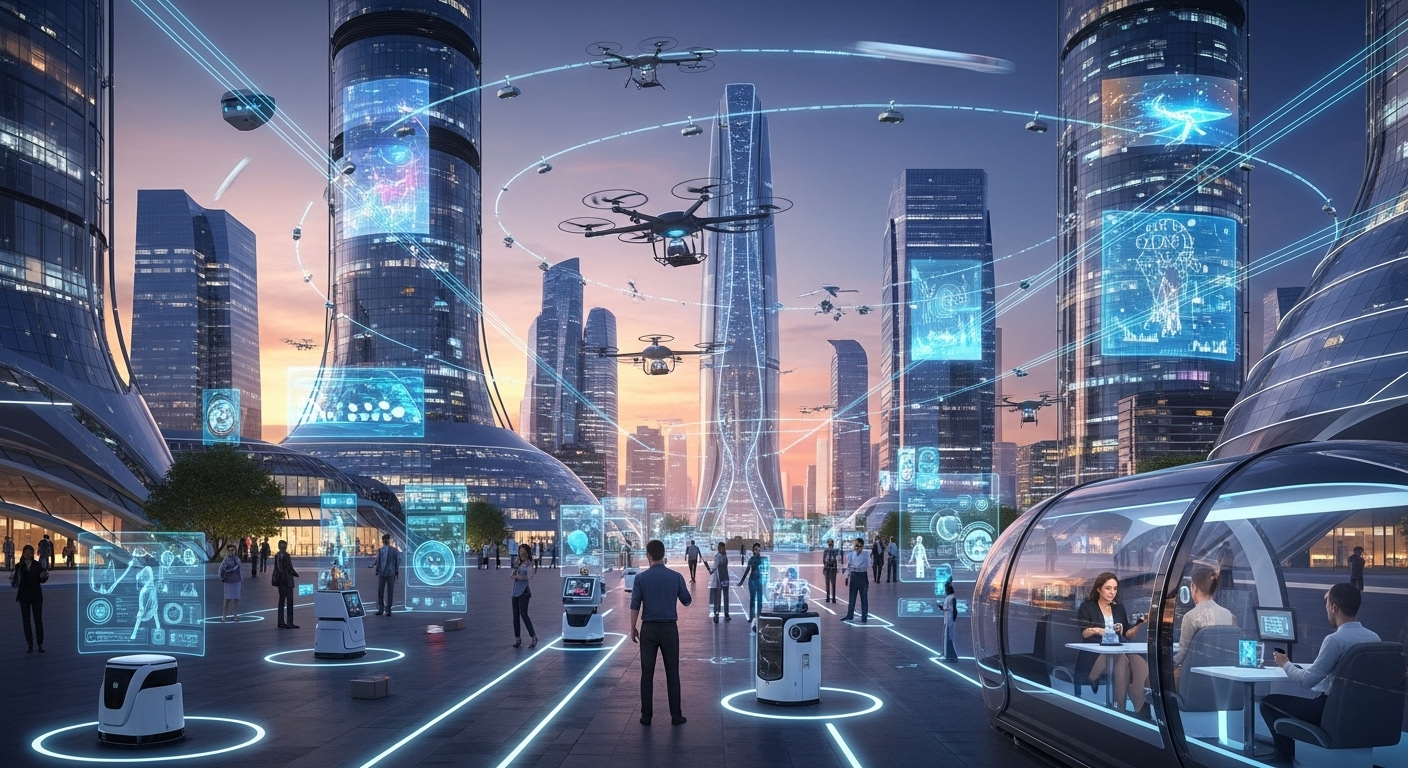As we advance into the 21st century, the pace of technological development is accelerating at an unprecedented rate. From artificial intelligence (AI) to space exploration, the innovations shaping our world are both fascinating and transformative. Technology is no longer just about gadgets or software; it is deeply integrated into every facet of human life. In this blog post, we will take a deep dive into some of the most exciting technological innovations today and explore how they are set to shape the future. By understanding the potential of these advancements, we can better appreciate the incredible possibilities awaiting us in the not-so-distant future.
Artificial Intelligence: A New Era of Automation and Intelligence
Artificial Intelligence is undoubtedly one of the most profound technological developments of the 21st century. AI refers to the simulation of human intelligence in machines that are programmed to think, learn, and problem-solve. While AI has existed in some form for decades, recent advancements have propelled it into a new era. Machine learning, a subset of AI, allows machines to learn from data, identify patterns, and make predictions with minimal human intervention. This is not just theoretical; AI is already being implemented in real-world applications with incredible results.
In industries like healthcare, AI is improving patient outcomes by assisting in diagnostics and treatment plans. AI-powered systems can analyze vast amounts of medical data far more quickly than a human could. For example, AI algorithms are being used to scan medical images, such as X-rays and MRIs, with an accuracy that rivals that of trained radiologists. This could lead to faster diagnoses and earlier detection of diseases, which is crucial for saving lives.
In the automotive industry, AI is transforming transportation with the development of self-driving cars. Companies like Tesla, Waymo, and Uber are all investing heavily in autonomous vehicle technology. Self-driving cars promise to revolutionize how we commute, reduce traffic accidents, and even reshape cities by reducing the need for large parking structures.
While AI holds tremendous promise, it also raises significant challenges, especially in terms of ethics, privacy, and the potential loss of jobs to automation. The rise of AI means that many traditional roles in industries such as manufacturing, customer service, and logistics could become obsolete. Therefore, it’s crucial that we carefully consider the societal implications of AI while encouraging responsible development.
Quantum Computing: Breaking the Boundaries of Traditional Computing
Quantum computing is another cutting-edge technology that is set to transform industries and solve problems that are currently beyond the capabilities of classical computers. Traditional computers rely on bits to process information, which can be either 0 or 1. In contrast, quantum computers use quantum bits, or qubits, which can exist in multiple states simultaneously. This property, known as superposition, enables quantum computers to perform complex calculations exponentially faster than classical computers.
Quantum computing has the potential to revolutionize fields like cryptography, material science, and drug discovery. In the field of cryptography, quantum computers could break current encryption systems, which rely on the difficulty of factoring large numbers. This poses a security risk for data privacy and online communications. However, it also opens the door to the development of quantum-resistant encryption techniques that will be virtually impossible to crack with classical computers.
One of the most exciting applications of quantum computing is in drug discovery. Traditional drug discovery involves testing a vast number of compounds to see which ones interact most effectively with specific biological targets. This process can take years and often yields limited results. Quantum computing could dramatically speed up this process by simulating molecular interactions at a quantum level, allowing scientists to discover new drugs more efficiently. This has the potential to revolutionize medicine and provide cures for diseases that are currently incurable.
Although quantum computing is still in its early stages, significant progress has been made. Tech giants like IBM, Google, and Microsoft, as well as startups like Rigetti Computing, are investing heavily in this area. While we are not yet at the stage where quantum computers are widely available, the rapid advancements in quantum hardware and algorithms signal that this technology will soon play a central role in solving some of the world’s most complex problems.
Biotechnology: Transforming Healthcare and the Environment
Biotechnology is another area where significant advancements are being made. In recent years, biotechnology has become one of the most promising fields in terms of both healthcare and environmental sustainability. At the core of these advancements is genetic engineering, the ability to manipulate an organism’s DNA in order to enhance or modify its traits. One of the most groundbreaking innovations in biotechnology is CRISPR-Cas9, a gene-editing technology that allows scientists to make precise changes to DNA, potentially correcting genetic disorders or creating genetically modified organisms (GMOs) with desirable traits.
In healthcare, CRISPR and other gene-editing technologies hold the promise of curing genetic diseases. Conditions such as sickle cell anemia, cystic fibrosis, and muscular dystrophy, which are caused by mutations in specific genes, could one day be cured by directly modifying the defective genes. This would represent a monumental leap forward in medicine, as we could treat the root cause of these diseases rather than just alleviating symptoms.
Biotechnology is also playing a significant role in the fight against climate change. Scientists are developing genetically modified crops that can withstand extreme weather conditions, resist pests, and produce higher yields, which could help feed a growing global population. In addition, researchers are working on creating organisms that can absorb carbon dioxide from the atmosphere, potentially reducing the impacts of greenhouse gas emissions.
However, as with any transformative technology, biotechnology also raises important ethical questions. The ability to edit genes in humans, animals, and plants could have unintended consequences, both for individuals and the environment. Additionally, there are concerns about the potential for “designer babies,” where genetic traits are selected to enhance intelligence, physical appearance, or athletic ability. These questions must be carefully considered as biotechnology continues to evolve.
Renewable Energy: Powering the Future with Clean Technology
As the world grapples with the consequences of climate change, the need for sustainable and renewable energy sources has never been more urgent. Renewable energy technologies, such as solar power, wind energy, and hydropower, are rapidly advancing and becoming more efficient. Solar panels are now cheaper, more efficient, and easier to install than ever before, making solar energy a viable option for homeowners and businesses alike. In addition, wind turbines are becoming more powerful and capable of generating significant amounts of electricity, even in areas with less wind.
The development of energy storage technologies, such as advanced batteries, is also crucial for the widespread adoption of renewable energy. Since solar and wind energy are intermittent—dependent on sunlight and wind—energy storage is necessary to ensure a stable power supply when the sun isn’t shining or the wind isn’t blowing. Companies are investing heavily in new battery technologies, including solid-state batteries and flow batteries, which could store more energy for longer periods and reduce the cost of energy storage.
In addition to reducing our reliance on fossil fuels, renewable energy technologies have the potential to create millions of new jobs worldwide. Solar panel installers, wind turbine technicians, and energy storage engineers are just a few examples of the types of jobs that will be in high demand as the transition to renewable energy accelerates.
While the future of renewable energy looks promising, there are still challenges to overcome. For example, the production of solar panels and wind turbines requires raw materials such as lithium and cobalt, which are limited in supply and often sourced from regions with questionable labor practices. As renewable energy technologies continue to develop, it is crucial to ensure that they are not only environmentally sustainable but also socially responsible.
Space Exploration: Reaching for the Stars
Space exploration is another area where technology is rapidly advancing. For decades, space missions were the domain of government agencies such as NASA and the European Space Agency. However, private companies like SpaceX, Blue Origin, and Rocket Lab are now leading the charge in space exploration. These companies are developing reusable rocket technology, which is significantly reducing the cost of space travel. The development of reusable rockets has the potential to make space exploration more accessible and pave the way for a new era of commercial space travel.
One of the most ambitious goals of space exploration is the colonization of Mars. Companies like SpaceX are working on developing spacecraft capable of transporting humans to the Red Planet. While sending humans to Mars presents significant challenges, such as radiation exposure, life support systems, and long-duration space travel, the potential rewards are enormous. Establishing a human presence on Mars could serve as a backup for humanity in case of catastrophic events on Earth, such as climate change or asteroid impacts.
In addition to Mars, the Moon is also a key focus for future space missions. NASA’s Artemis program aims to return humans to the Moon by 2024 and establish a sustainable lunar presence by the late 2020s. The Moon could serve as a stepping stone for further exploration of the solar system and provide valuable resources, such as water ice, that could support future missions to Mars and beyond.
The future of space exploration is not limited to human missions. Robotic probes and telescopes are continuously providing us with new insights into the far reaches of the universe. The James Webb Space Telescope, set to launch in 2021, will allow scientists to observe distant galaxies and search for signs of life on exoplanets. These advancements will not only expand our understanding of the cosmos but could also lead to discoveries that change our perception of our place in the universe.
Conclusion: Embracing the Technological Future
As we look to the future, it is clear that technology will continue to shape our world in profound ways. From artificial intelligence and quantum computing to biotechnology and space exploration, the possibilities are limitless. These innovations hold the potential to solve some of humanity’s most pressing challenges, from curing diseases and combating climate change to improving education and advancing space exploration.



